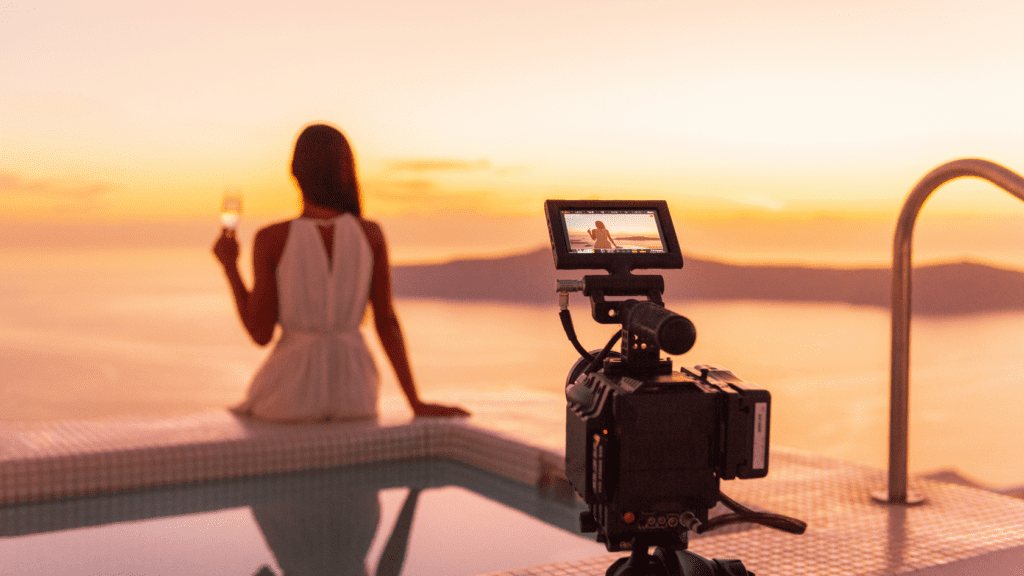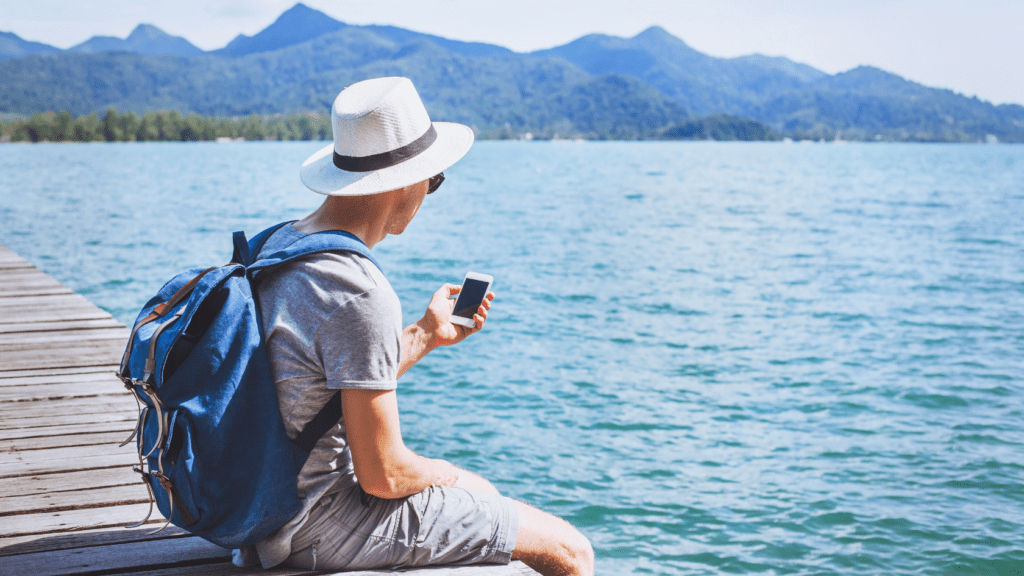The tourism industry is highly competitive, and as a result, your online presence is often the deciding factor between a fully booked season and missed opportunities. Travellers increasingly rely on search engines to research destinations, plan trips, and book experiences, which makes tourism SEO the process of optimising websites rank highly in search engine results pages (SERPs)—a vital strategy for success.
The Role of Tourism SEO in the Industry
Tourism SEO for websites is about ensuring your business is visible to potential customers when searching for travel-related terms. It helps companies rank for crucial search queries, attract high-quality traffic, and, most importantly, convert visitors into paying customers.
This article will explore how tourism businesses can harness SEO to drive sustainable growth and stand out in an ever-evolving digital marketplace.

Why Tourism SEO is Essential for Sustainable Growth
Sustainable growth is about more than just attracting visitors. It’s about building long-lasting relationships and a responsible business model. Tourism SEO helps you rank higher in search results and fosters a steady, organic stream of traffic that reduces dependency on paid ads and third-party platforms. By implementing ethical, eco-conscious SEO strategies, your business can promote sustainable tourism practices while ensuring long-term visibility and growth, aligning with the increasing consumer demand for responsible travel options.
Changing Consumer Behaviour
The way people plan their trips has fundamentally shifted. According to industry statistics, over 80% of travellers begin their journey with a search engine like Google. Tourism SEO ensures that your website is the first thing potential customers find when searching for relevant terms. Travellers no longer rely on traditional travel agencies or guidebooks; they expect to find information instantly via search engines.
If your tourism website is not optimised for SEO and the terms and questions your customers are searching for, you could miss out on valuable impressions, visibility, traffic and bookings.
Growing Industry Competition
In the tourism industry, competition is fierce. Whether you’re a global hotel chain, a small travel operator, or a local guide, everyone competes for the same travellers’ attention.
Tourism SEO for websites can be a great equaliser. By focusing on optimising for specific niche keywords and long-tail queries, even small businesses can compete against large competitors. It’s not about having the biggest marketing budget. It’s about having the best SEO strategy.
Local SEO’s Impact on Tourism
Local SEO is crucial for tourism businesses that cater to specific geographical areas. Whether you’re a restaurant, hotel, or attraction in a popular destination, Tourism SEO can help ensure that your business appears in potential customers’ local search results. Lots of tourists and travellers search for services and experiences once they’ve landed at their destination.
A solid local SEO presence ensures you capture spontaneous, in-destination searches.
Key Elements of a Successful Tourism SEO Strategy
A successful Tourism SEO strategy requires a well-rounded approach that balances technical optimisation and engaging content. From identifying the right keywords to targeting local search and enhancing user experience, each element is critical in boosting your website’s visibility and driving sustainable growth. By focusing on these vital aspects, tourism businesses can attract more organic traffic, convert visitors into bookings, and create a seamless digital journey that keeps travellers returning.
On-Page Optimisation
On-page optimisation is one of the foundational pillars of Tourism SEO. This involves optimising individual pages on your website to ensure they are fully aligned with the keywords your potential customers are searching for.
- Targeted Keywords: Use tourism-specific keywords such as “best destinations in [location]” or “luxury hotels in [location]” to capture intent-driven traffic. Optimising for long-tail keywords like “family-friendly tours in Barcelona” can help smaller businesses rank for highly specific searches.
- Meta Titles and Descriptions: Ensure every page on your tourism website has unique meta titles and descriptions, which not only help with rankings but also improve click-through rates (CTR) by encouraging users to visit your site.
- Landing Pages: Create dedicated landing pages for each destination or service. For instance, a travel company offering tours in Italy should have separate pages optimised for “wine tours in Tuscany” and “historical tours in Rome.”
Local SEO Optimisation
For tourism businesses with physical locations, local SEO is indispensable. An excellent local strategy involves ensuring your business ranks well in location-based searches, such as “restaurants near me” or “best hotels in [city].” Here’s how you can master Tourism SEO for websites with local SEO techniques:
- Encourage Reviews: Positive reviews on Google, TripAdvisor, and similar platforms build trust and authority in local search results, directly influencing your rankings.
- NAP Consistency: Ensure your business’s Name, Address, and Phone number (NAP) are consistent across all platforms, including Google Business Profile, Yelp, and other directories.
- Schema Markup: Implement structured data to directly highlight business information such as opening hours, pricing, and customer reviews in search results. This additional data makes your listing more attractive and clickable.

Content Marketing for Tourism SEO
Content is powerful in tourism. Good quality, relatable, informative content attracts search engine traffic and engages potential travellers with your website during the research phase of their journey.
- Blogging: Blog posts about travel tips, hidden gems, and destination guides rank well and position your brand as an authority in the industry. For example, writing about “The Top 10 Things to Do in Paris” can attract users who are researching their Paris holiday and push them towards booking with you.
- Visual Content: Images and videos are a powerful way to showcase your destination or services. By optimising alt-text, file names, and even captions, you can rank in Google’s image and video searches, opening another avenue for organic traffic.
Advanced Tourism SEO Tactics for Competitive Advantage
To truly stand out, businesses must adopt advanced Tourism SEO tactics that leverage emerging trends such as voice search, mobile-first optimisation, and video SEO. These cutting-edge strategies not only enhance your website’s visibility but also cater to the changing behaviours of modern travellers. By implementing these advanced tactics, tourism businesses can gain a competitive edge, attract high-intent visitors, and convert more traffic into bookings.
Voice Search Optimisation
Voice search is becoming a dominant way for users to search online, with more people using assistants like Siri, Alexa, and Google Assistant to find answers. To optimise your tourism website for voice search, consider targeting conversational keywords and natural language phrases like “What are the best hotels in the Cotswolds?” or “Best outdoor activities for families in the Lake District.”
Mobile-First Optimisation
More than 70% of travel industry searches happen on mobile devices. Ensuring your website is mobile-friendly is not just an option—it’s essential for Tourism SEO. Mobile optimisation includes ensuring fast page load speeds, easy-to-navigate menus, and responsive design so your website looks great on any device.
Video SEO
YouTube is the world’s second-biggest search engine, behind Google, meaning video content is an incredible asset for tourism businesses.
Optimise video content for tourism-related search terms and include engaging descriptions and tags. In addition to targeting the right keywords, make sure your video descriptions are detailed and engaging, providing viewers with a clear idea of what the video covers while incorporating relevant keywords naturally.
Remember to include keyword-rich tags and a strong call-to-action in the description, encouraging users to visit your website, book a service, or explore more content. Well-optimised video content enhances your search engine rankings and increases the likelihood of engagement, sharing, and conversions.

Measuring the Success of Your Tourism SEO Strategy
How do you know if your Tourism SEO for website efforts are paying off? Measuring and analysing your SEO performance is crucial to understanding what works and needs improvement. Here are key metrics to monitor:
- Organic Traffic: Track the number of visitors coming from organic search and how it grows over time.
- Keyword Rankings: Ensure that your tourism website ranks higher for the terms you’re optimising, such as “best tours in [city]” or “luxury hotels in [destination].”
- Bookings and Conversions: Ultimately, your goal is to convert traffic into bookings. Monitor conversion rates and analyse how SEO is directly impacting your revenue.
A travel business we have worked with frequently monitored keyword performance and adapted its strategy quarterly seeing a 46% increase in organic traffic and a boost in direct bookings over just six months.
The Role of Technical SEO in Tourism Websites
While content and keywords are crucial elements of Tourism SEO, the foundation of any successful SEO strategy lies in Technical SEO. Technical SEO ensures that your website is not only visible to search engines but also optimised for performance, user experience, and accessibility—factors that are critical for tourism businesses looking to attract and retain customers online.
Website Speed and Performance
Users often compare multiple services and destinations, this means every second counts. Studies show that a website’s bounce rate increases dramatically if a page takes more than three seconds to load. Slow-loading pages can lead to a poor user experience and a drop in search engine rankings. Optimising page speed is crucial in technical SEO, involving compressing images, minimising CSS and JavaScript files, and leveraging browser caching.
For a tourism website, this can mean the difference between a user staying on your site to explore more content or book services and bouncing to a competitor’s site.
Mobile Optimisation
Mobile devices now account for more than half of all travel-related searches. Therefore, mobile optimisation is a non-negotiable aspect of Tourism SEO. It is vital to ensure that your website is mobile-friendly—meaning it adjusts seamlessly to different screen sizes, loads quickly, and offers easy navigation on a phone or tablet.

URL Structure and Site Architecture
A well-organised, logical URL structure helps users navigate your tourism website easily and allows search engines to crawl and index your pages more effectively. Clear, descriptive URLs give search engines and users a sense of what the page is about, improving both SEO and user experience.
Regarding site architecture, a flat structure (where each page is easily accessible within a few clicks) can enhance crawlability, allowing search engines to find and index all important pages efficiently. This is particularly important for tourism websites that often feature multiple service pages, blog posts, and destination-specific landing pages.
Indexing and Crawlability
Technical SEO ensures search engines can crawl and index your website correctly. If your tourism website has pages not being indexed, they won’t appear in search results—no matter how good the content is. Tools like XML sitemaps and robots.txt files help search engines understand which pages to crawl and index. Regularly checking your website for crawl errors or indexing issues in Google Search Console is essential to ensure that search engines see all your important pages.
For tourism businesses, especially those with large, content-rich websites, ensuring crawlability is key to ensuring that their booking pages, blog posts, and service information reach the right audience.
Structured Data and Schema Markup
Structured data, or schema markup, helps search engines better understand your website’s content, allowing them to display rich results like reviews, prices, and event details directly in the SERPs. For tourism websites, adding schema markup can enhance listings by displaying star ratings, business hours, and even booking availability directly in search results. This added layer of information can significantly increase click-through rates and lead to more conversions.
For example, schema markup to display reviews for your hotel or real-time availability for tours can make your listing stand out among generic results, drawing in more clicks from potential customers.
Why Technical SEO is a Must for Tourism Businesses
Trust, speed, and user experience are essential in the tourism industry. If your website performs technically well, visitors will likely stay long enough to explore your offerings or make a booking. Poor technical performance can significantly undermine your SEO efforts even with solid content and targeted keywords. By prioritising Technical SEO, tourism businesses can create a smooth, fast, and accessible user experience that boosts search rankings and encourages users to take action—whether reading a blog, booking a tour, or contacting your business.
Case Study: How Technical SEO for a Global Tour Operator Decreased Website Errors by 96%
We delivered an in-depth website audit for a market-leading travel business. This included a full breakdown of technical, on-page, off-page, and content structure, as well as a detailed SEO worksheet to implement fixes, tweaks, and changes. All work was completed in 60 days.
The results:
- 96% decrease in errors (11,054 down to 463)
- 742% increase in site visibility (from 322 to 2712 indexed pages)
- 62% decrease in warnings
- 752 toxic backlink domains removed
- 325 domains were contacted manually to remove toxic links

Wrapped: The Future of Tourism SEO and A Checklist for Success
As the tourism industry becomes increasingly competitive and digital, investing in tourism SEO for websites is no longer optional—it’s essential for long-term success.
Evolving consumer behaviours, emerging technologies, and the growing emphasis on sustainable and ethical practices will shape the future of tourism SEO.
AI and Personalisation
Artificial Intelligence (AI) and machine learning play an ever-growing role in SEO. AI can provide tourism businesses with personalised experiences based on user data, improving customer satisfaction and engagement.
Imagine offering tailored destination recommendations or travel packages based on a user’s previous browsing behaviour. Implementing personalisation at this level will make your website more relevant to individual users, increasing the likelihood of bookings.
Voice Search Optimisation
The rise of voice search is changing how people search for travel-related services. This shift is particularly significant for the tourism industry, where users are often looking for instant, location-specific results, such as “best restaurants near me” or “top tours in [city].” Adapting your Tourism SEO for websites to focus on conversational search terms and localised content will be crucial for staying competitive.
Sustainability and Ethical SEO
Sustainability is more than just a buzzword—it’s a core value for many travellers. Businesses incorporating eco-friendly, sustainable tourism practices into their SEO strategy will appeal to an audience increasingly concerned with ethical travel.
Highlighting your commitment to these values through content and SEO can set your business apart, especially as consumers become more selective about where they spend their money.
Tourism SEO Checklist: Are You Ready for Success?
Here’s a comprehensive checklist to help you assess your current Tourism SEO strategy. Use this to identify areas where you are performing well and where you may need improvement:
How to Move Forward with Your Tourism SEO Strategy
Now that you have a checklist, it’s time to take action. Tourism SEO for websites is an ongoing process that requires regular updates, analysis, and optimisation. However, the payoff is worth the effort with increased visibility, more bookings, and a stronger, more sustainable business.
Start by reviewing your current SEO efforts against this checklist. Identify the areas where you can make quick wins, such as optimising for mobile or encouraging more reviews, and then move on to larger, long-term strategies like creating personalised content or building a powerful backlink profile.
The tourism industry is highly dynamic, and the strategies that work today may evolve in the coming years. By staying on top of AI, voice search, and ethical tourism trends, you’ll be well-positioned to keep your business ahead of the curve and continue attracting travellers worldwide.
By following this detailed checklist and embracing the latest trends in Tourism SEO, you can build a future-proof strategy that keeps your business thriving, no matter how the digital landscape shifts.
Ready to Take Your Tourism SEO to the Next Level?
Is your tourism business ready to stand out in search and attract more bookings? At BQC, we specialise in crafting tailored Tourism SEO strategies that deliver tangible results. Whether you’re looking for an in-depth SEO audit, long-term strategy, or quick optimisation wins, we’re here to help.
Explore how our SEO Consulting Services can drive more traffic to your site and boost your rankings. We also offer SEO packages designed to fit your business needs, ensuring you get the best possible return on your investment. If you’d like to discuss how we can help your business grow, please book an introduction call and let’s start a conversation.
Start boosting your visibility and driving more direct bookings with a successful strategy.



